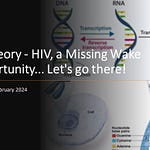HIV - A Virus Like No Other needs no introduction. It is a masterpiece with 383 references and notes that was published as a summary of the Perth Group’s research on HIV over the course of nearly 40 years. The paper is undoubtedly unmatched on the subject of No Virus and deserves a thorough assessment by anyone who wants to better understand not just the subject of HIV but also the subject of No Virus. The group’s critique of the literature cuts through the nonsense that we have all come to know virology to be. The group’s unique breakdown of the issues is the foundation on which everyone now evaluates the literature on this topic.
If you’d like to view the graphs, figures, notes and references mentioned in the text to speech audio please see the paper here.
Explanatory note
On 21st February 2017 the Perth Group emailed this manuscript to Nature, The Lancet, the British Medical Journal, Science, Medical Hypotheses, the Journal of the American Medical Association and the New England Journal of Medicine.
The following covering note was addressed to each editor-in-chief.
My colleagues and I have a somewhat unusual request of your editorial office. The attached document is a detailed re-evaluation of the HIV/AIDS theory. For several decades we have closely followed the evolution of this theory and the data upon which it was based. In our view the theory was formulated on evidence and observations that were not always subjected to the expected strict scientific rigour. Consequently its conclusions and predictions need to be thoroughly questioned and the precise nature of "HIV" redefined.
We are aware that the topic is contentious, especially as some well-publicised challenges to the orthodox view have had deleterious public health implications.
Our request to you as guardians of scientific thought and integrity is to assess our critique, and see whether in your considered opinion it is worthy of being brought to the attention of the scientific community. If you decide that it is, we would then like to prepare, under your guidance, a concise version for publication.
Despite repeated requests, three editors did not acknowledge receipt of our email. All responses came from editorial committees. One was “we do not encourage pre-submission enquiries”; another, we “respectfully pass on having the opportunity to publish a paper on this topic at this time. Best of luck publishing your work in another good journal”. A third, “After considering its focus, content, and interest, we made the editorial decision not to consider your proposal further. We are informing you of this decision promptly so that you can submit your manuscript elsewhere”. All replies ignored our request for a private appraisal and/or responded as if the manuscript were a submission for publication (a futile exercise given that no editor would accept a paper of this length).


















HIV - A Virus Like No Other